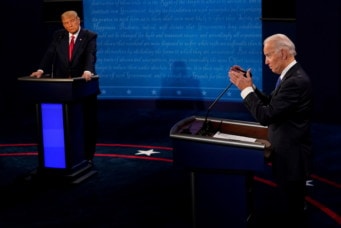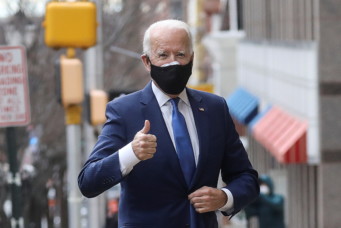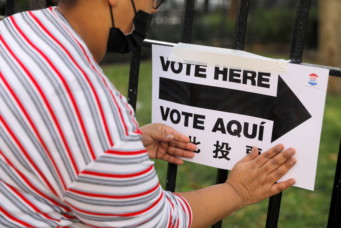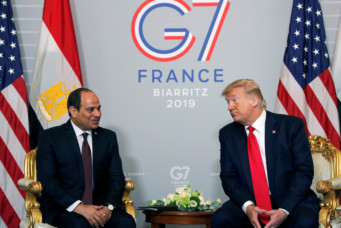Does the Biden Administration Have Time for Foreign Policy?
As the United States moves back to a more traditional presidency, the world questions the new administration’s ability, much less willingness, to take a leading role in world politics amid more demanding issues at home
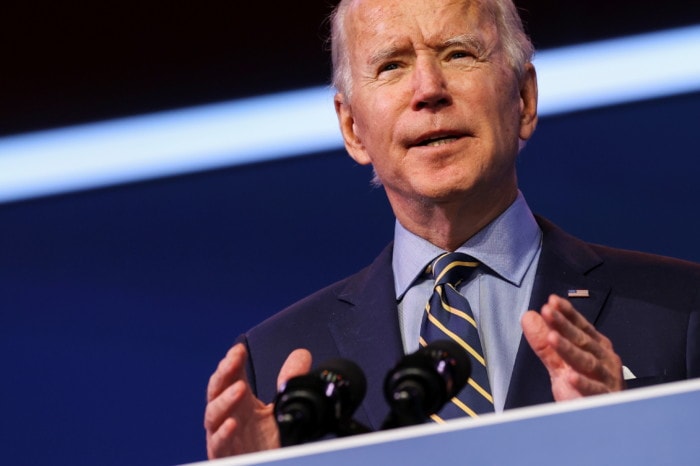
U.S. President-elect Joe Biden delivers a speech after a conference video call focused on foreign policy, Wilmington, Delaware, Dec. 28, 2020. Jonathan Ernst/Reuters
“It’s not a matter of choice,” said Francis J. Ricciardone, president of the American University in Cairo (AUC), during the 91st Tahrir Dialogue webinar titled “U.S.–Arab Relations.”“Even those administrations that came in and emphasized domestic policies found that they can’t afford to ignore the world, and the Middle East in particular,” added Ricciardone, who is also a former U.S. ambassador to Egypt and Turkey.
His remarks were a part of the discussion hosted by Founding Dean of AUC’s School of Global Affairs and Public Policy and former Egyptian Foreign Minister Nabil Fahmy with guest panelists Shibley Telhami, director of the University of Maryland Critical Issues Poll, and Alan Stoga, chairman of the Tällberg Foundation.
The discussion, which centered around the course U.S. President Joe Biden might chart in dealing with major global challenges, and the Middle East in particular, was moderated by Ibrahim Awad, director of the Center for Migration and Refugee Studies at AUC.
The speakers agreed early on that the United States will likely pursue a reactive approach to foreign affairs. “We [the United States] don’t do strategy anymore, we do tactics. We are reactive,” Stoga said. Unless pressing, the region’s issues are not likely to attract Congress or the President as they deal with more immediate domestic priorities.“This is a government that comes to power at a uniquely bad moment; recession, the pandemic, but far more importantly, we are in the midst of a crisis in our own democracy,” he explained.
Telhami added that the Biden administration comes after an executive-style presidency with a distinctively transactional approach to foreign policy, as seen in the U.S. recognition of Moroccan sovereignty over the Western Sahara in exchange for Morocco’s peace and normalization with Israel. Rather, the Biden’s White House is a comeback of a more traditional U.S. presidency where more competent policymakers take hold and address challenges.
Previously, “The Trump administration, for accidental reasons, made the Middle East a top priority,” Telhami said. He pointed out that former President Donald Trump subcontracted the Middle East to his son-in-law, Jared Kushner, who served as a senior advisor to the White House and took on the agenda of the Israeli-Palestinian conflict. Those who ideologically prioritized the Middle East found that they had the power and support of the presidency behind them, and since Kushner’s views are highly favorable of Israel, Middle East policy was largely driven by the priorities in Tel Aviv.
During the Trump presidency, the region witnessed landmark decisions including the aforementioned Moroccan deal, the removal of Sudan from the U.S. State Sponsors of Terrorism list, and the selling of F-35 fighter jets to the United Arab Emirates. Telhami emphasized that these policy decisions required the White House to substantially mobilize American power and gain Congressional support. Biden’s administration is unlikely to mobilize U.S. influence on that scale again.
For the time being, the Biden administration’s primary foreign policy concern is undoing Trump’s work as the United States gives precedence to striking a deal with Iran after the former president scrapped an existing nuclear agreement, and renewing aid and dialogue with the Palestinians after both were suspended. In walking back some of Trump’s regional policies, Biden announced ending U.S. support for the Saudi-led offensive in Yemen. The administration also suspended arms sales to Saudi Arabia and the UAE pending a routine State Department review.
That being said, the speakers agreed that not every Trump decision can be undone. It is implausible, for example, for the Biden administration to reverse the Trump decision to move the U.S. embassy from Tel Aviv to Jerusalem.
But the greatest change may come as the current administration pursues what was the Obama administration’s goal of withdrawing from the Middle East. “I don’t think the ‘if’ question is if we [the United States] are going to withdraw, but the question is the pace of withdrawal, and the nature of withdrawal,” said Stoga.
That is the balance that the Biden administration hopes to strike, and in doing so, it is expected that a United States that is more supportive of NGOs, international, and regional organizations will arise as it aims to hand over or share the burdens of global leadership.
In spite of the United States’ overall withdrawal from global politics, it still needs to restore its influence on the global stage. “In the past, the world overestimated U.S. knowledge,” said Ricciardone. Now, the issue seems to be the opposite. “The challenge of restoring American influence and the perception of competence comes from demonstrating it both in domestic affairs and internationally,” he added. Such an approach can help the United States regain some footing within the international community without dominating it.
However, Fahmy believes that U.S. policymakers “look at the world the way it used to be”. “I’m not sure I see anybody there who’s looking at the world where America is not a global superpower—where there isn’t a cold war.” This predicates a need to evaluate what role the United States has to play in the absence of a huge threat (think the Soviet threat of the 20th century), as most current conflicts are regional and involve non-state actors.
Fahmy also questioned whether American citizens even want to engage with global politics, and how that stands in the way of a more proactive U.S. foreign policy if the administration wishes to pursue that route.
To that, Ricciardone quotes the late former Chairman of the U.S. Senate Committee on Foreign Relations Richard Lugar in saying, “Do not sell the American people short.” He elaborated that one should not assume indifference from U.S. citizens. Engaging them on foreign affairs is a challenge of leadership that requires patient engagement.
The speakers agreed that the Biden administration has to make time for foreign policy, and it cannot ignore the issues of the Middle East. However, for the foreseeable future, the United States is expected to step down from its pedestal and leave the reins to the countries who themselves hold the stakes. Middle Eastern states will have to step up and engage as the United States looks introspectively and updates its policies to reflect the new position it is setting up for itself within the international sphere.
Basant Samhout is a reporter-researcher at the Cairo Review of Global Affairs.
Read More
